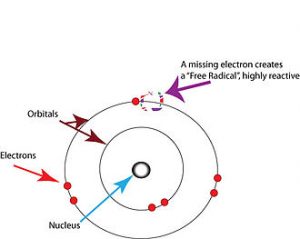What are free radicals? Why do they cause damage to your body? And how do antioxidants help protect the human body against damaging free radicals? In this article we will answer these questions in order to help you understand why antioxidant rich food and liquids can be beneficial to your health.
What Are Free Radicals?

According to Rice.edu, free radicals are atoms or groups of atoms with an odd (unpaired) number of electrons. They can form when oxygen interacts with certain molecules within your body. Once free radicals form, they are highly reactive and can start unhealthy chain reactions and damage your body. For instance, they can cause damage when they react with important cellular components such as cell membranes or your DNA. If this occurs, cells can potentially loose important functionality or die completely. To prevent free radical damage the body has a defense system of antioxidants. However, it’s also beneficial to intake additional antioxidants in case your your body isn’t producing enough or to ensure free radicals do not form.
How Free Radicals Form
Bonds don’t typically split in a way that leaves a molecule with an odd, unpaired electron. However, when weak molecular bonds split, free radicals can form. They are extremely unstable and can react very quickly with other compounds, in order to capture an electron to gain stability. Generally speaking, free radicals attack the nearest “stable” molecule, effectively stealing its electron. When that molecule loses its electron, it turns into a free radical itself, starting an unhealthy chain reaction. Once this chain reaction starts, it can disrupt and adversely affect or kill a living cell. Typically, our bodies can handle free radicals, however, if antioxidants are unavailable, damage can occur. It’s also important to note that free radical damage has a cumulative affect accruing with age.
How Antioxidants Can Mitigate Free Radical Damage
Antioxidants play an important role in guarding against the free radical formation in the body. Some believe, antioxidants can even slow the aging process and even preventing heart disease or strokes. However, tests and preliminary data are still inconclusive. Nonetheless, we do know antioxidants fight free radical formations and subsequent chain reactions. That’s why its important to understand how your diet can influence molecular bonds an/or chemical reactions within the body. Essentially, increasing you intake of antioxidant rich foods or liquids can effectively mitigate free radical damage. Because antioxidants are understood to be stable in nature, they may act as “floaters”, helping to prevent cellular and tissue damage.
Antioxidant Rich Foods & Liquids
The vitamins C & E, are generally thought to guard against destructive free radicals. Antioxidants can neutralize free radicals by giving up one of their electrons, effectively stopping the electron stealing chain reaction discussed earlier in this article. We suggest eating 4-8 servings of vegetables and/or fruits per day. Drinking liquids such as alkaline water are also supposed to supply antioxidants due to the increased pH levels. Alkaline water has the ability to give up electrons, therefore may be a good option to compliment your new antioxidant rich diet.
